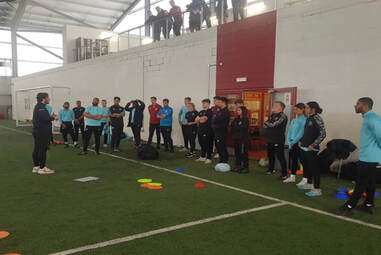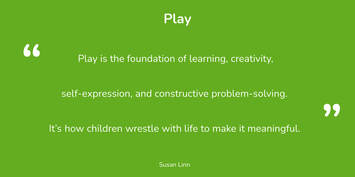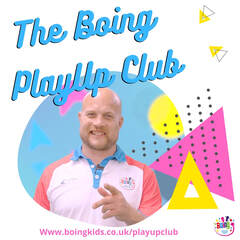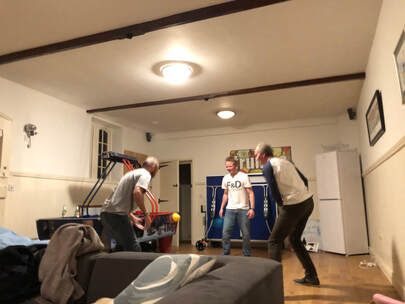|
Hey there!
Welcome to the latest addition to the Boing blog! My name is Ben, and I’m our Lead Coach Developer here at Boing. I lead a lot of our bespoke work with our fantastic partners, as well as support the building of our resources. As we continue our journey into the world of play, physical activity, and all things movement, we thought best to share some of our journeys up to this point. I have the privilege of being first up! As a (relatively) decent footballer, sport was central to my identity growing up, and subsequently formed a huge part of my career so far. In essence, you could say that I have massively benefitted personally and professionally from my relationship with sport over the years. However, a key aspect of the work of our team here at Boing is to be as introspective and reflective as we can be! Acknowledging how physical activity and sport benefits some, but not all. Our mission has always been to change that! Rolling back to 2015, Boing took their first few steps into trying to change the world of movement for young people. Initially, Boing was a delivery focused initiative, utilising students from Oxford Brookes University to deliver PlayGames from our PlayTank within a group of schools in Oxfordshire. This also happened to be the start of my involvement with Boing, working on the ground delivering games in schools. Our goal at this point was to try and show what Physical Education could look like. That we could move away from more traditional models of movement, by embracing the messy and chaotic world of play. Of course, this did not come without its struggles. A key learning outcome for the Boing team was how to find the balance between child/learner autonomy and freedom, with purposeful and intentional learning outcomes. If you have jumped on a virtual course before, you may have heard us use the metaphor of how we are trying to support a learner ‘jump on the spinning carousel’. If the carousel is spinning too fast, our learners can’t access the game. Spinning too slowly and it’s too easy to jump on. Finding the right speed to stretch our learners, but giving them some success is where the magic happens! So how do we control the spinning carousel? The tool I’m going to focus on here is becoming the Play Maker! The Play Maker is the architect of the learning space, responding to the needs of the learners in that setting. We want to challenge the role of the practitioner in the learning space to be more active, more dynamic, and more responsive. The practitioner as Play Maker becomes an active ingredient in the Play Game. Let’s take our Play Game ‘Escape the Zoo’. Escape the Zoo involves the group of learners moving around the space to collect their food, and return it to their nest. They must negotiate the space whilst moving like their favourite animal and avoiding the zookeepers (Check the game out on the link above). Once we have our Play Game set up, the Play Maker comes alive! 1. We could challenge the whole group by changing the context, switching between night and day, or dry and wet land. By noticing that the game needs to speed up, or slow down, we can make this change to the learning space. By changing the context of the game, we also allow our learners to access their imagination and take ownership of their learning experience. 2. We may also find a learner who is having higher amounts of success. As the Play Maker we could shape their experience by challenging them to move like an animal with a certain number of points of contact with the floor (i.e moving from 2, to 3 or 4). By challenging how they engage with the problems set, we can help them explore new and different ways of how their body relates to the space it is in. 3. We could also give each individual learner greater ownership and autonomy in the learning space. By providing a range of different equipment in the learning space, and assigning different food items based on the colour or shape of the equipment, learners will have to move more purposefully to ensure the animal they choose is getting the food that they choose. 4. If our learners are not having much success then we could manipulate how the zoo keepers engage with the game. We could change how the zoo keepers must tag the animals to return them to the zoo by asking them to tag with two points of contact, or give the zoo keepers a ball that they must tag the animals with. We could also provide the zoo keeperswith a movement problem, constraining them to only hop around the learning space, or provide them with throw down discs/cones which they must use to stand on as they move around the learning space. The Play Makers job in this respect is key. Our job is to help learners explore, exploit, and execute different ways of solving problems with their bodies. The notion of embodiment, resonates with our understanding of physical literacy. We want to place learners in contexts that require them to negotiate a set of problems. By doing so, they’ll start to explore how their body relates to the world in different ways and in different spaces. We are not concerned with ever reaching the peak of the Physical Literacy mountain, rather, we are focused around ensuring every learner has an opportunity to understand how their body relates to the world, and give them confidence to continue on that journey throughout the life course. Our job is to help them on their way with change its, challenges and play ups. We have absolutely loved exploring this with some of our partners recently during our full day face-to-face workshops. Recently we teamed up with our friends at Loughborough Schools Foundation, supporting their team across their different school sights spice up their teaching toolbox with some of our Boing principles. Focusing on being active in the learning space, we experienced a few games from the Boing PlayTank, and then spent some time exploring their own games, whilst thinking about how to keep the game constantly regenerating, keep the problems dynamic, and how to support learners on different learning trajectories. I’m going to wrap up this brief post with an invitation for all those interested in exploring play as an incredible tool to change the nature of physical activity. Our Boing PlayTank is free to access, and we love seeing our friends and partners using our games within their worlds. So, as we approach the beautiful summer months, get out and play!! Pick 3 games from our PlayTank and go and explore them. We would love to hear your feedback on how they went, but most importantly we want to hear how much you enjoyed embracing play! If this isn’t enough for you, then book a course with us! We run virtual courses, as well as face to face courses where we explore all of our resources and PlayGames, as well as the underpinning principles of Boing. Over the next few months, we will hear from some of our other Boingers on the team and start exploring more of the key concepts that underpin our work! Yours in Play! Ben x
1 Comment
Lets return to playThe summer holidays are here and Covid restrictions are easing. It’s time to return to play! Playing out, playing together and playing just to enjoy life are all more important than ever for so many children and families after such a tough 18 months. Play is more important than everPlay, and in particular active play, is a vital way through which children will emerge from lockdown effectively. It so important in their development as it provides children with the chance to explore themselves and the world around them in a way that suits them. It’s how children learn who they are and how they get to know their imaginations. Moreover, play is how they build trust in their own abilities (not only physical, but also emotional, psychological and relational) and develop trust with others. In short, it is the fundamental arena within which children become who they are. It’s also the primary way children get the physical activity they need. However, the pandemic has had a huge impact on children’s right to play as a result of so many of their opportunities for play being shut down. 92% children felt the way they play had changed since the Covid pandemic (Save the Children, 2021) 51% said they were playing outside with their friends less (Save the Children, 2021) 23% were playing less than before the pandemic (Save the Children, 2021) 36% of children said that they’ve had fewer opportunities to be active (Greater Sport, 2021) As a result of these drastic changes children reported the following impacts: - Boredom (74%) - loneliness (65%) - Frustration (61%) (Morgul et al., 2020) But now the sun is out and we are able to return to play. Together we can make play better than ever for children, so let’s do it! However, this poses the question of “how as adults - coaches / activities leaders / parents or guardians - can we support children play in the most purposeful way possible?” Here are some thoughts…. Supporting great play as an adultAt Boing we are all about supporting parents, guardians, coaches, activity leaders and community leaders alike to facilitate great play for children across the country. What we have learnt (the hard way) over so many years of working with amazing practitioners is: ** The best thing we can do as adults is to set up play environments for children that invite them to solve problems, and offer them opportunities to act with imagination. And…do that by doing as little as possible to get in the way. But, doing what we do do with as much purpose as possible. ** The reason for this; children are the experts at play, and play by definition is something the player has to decide on, own the direction of and engage with on their own terms. That’s why we have created the Boing PlayUp Club. Check it out below for loads of ways to create engaging play environments for children. Sport England have also put together some great advice on how to get back out there, and what you can do to help everyone return to play safely and better than ever. Check it out here The six magic ingredientsSo what is great play exactly? To us, great play is when the rules of the games are not getting in the way and enforcing limits on where the players can take the game to or hindering them engage in the way they want to. At Boing, we think there is play, and then there is ‘Play!’, and ‘Play!’ involves at least some, if not all, of these magic ingredients:
And why exactly are these particular ingredients magic, I hear you ask... Being active - Playing whilst being active will develop a love for physical activity that will last a lifetime! Fun - If play is fun, then players are more likely to do it again another time. Imagination - Playing with imagination will develop players’ ability to make play what they want it to be and make it work for them. Adventure - Adventure in play will lead to being more willing to explore the unknown and investigate new places! Creativity - Being creative whilst playing is where the resilience and thinking skills needed to tackle any situation, any space and any problem are made. Collaboration - Playing together to achieve a goal, go on a mission together or create something new can build trust with others that can last forever. Therefore, our job as adults is to make sure we know what great play looks like, know the different ingredients that make up great play and then create environments for children to play in that include some or all of them. The paradox of playSo, try not to get in the way with too many rules or complicated game mechanics, but that doesn’t mean don’t get involved at all. Once we have set a play environment, one of the most effective things we can do is to find a way of playing with children - as equals - not always as facilitators. Be present in that play, evolve that environment together and engage with it fully as a play partner to the children. This is especially true for parents and guardians. Through playing together, indulging their ideas, saying yes to what their imagination comes up with, completing missions as a team and solving problems together, trust and connection builds up. This trust and connection can cement bonds that last for years, and help children become adults who want to form relationships with others and see the best in the world around them. #PlayYourWaySo, there are some thoughts on play, what it is, why it's great, why it's more important than ever and what we as adults can do to support children return to play. You can also find ways of making sure you’re using all these magic ingredients to make play as great as possible in the Boing PlayUp Guide. Hope you find it useful!
Stay safe and #PlayYourWay Sean x Hey Boingers, welcome to the PlayDiary. I will be writing some thoughts, reflections, learnings and hopefully some innovations from the team in this Blog to support the journey of our coaches, teachers and volunteers engaged with the Boing Project. I love working with coaches and teachers and supporting organisations - from grassroots to elite sport - and understanding what makes practices work for young people! As Director of Research and Impact at Boing I am fortunate to collate all the insights from our various teams and therefore this Blog is a way to crystallise this info and put it out to you all! This is my first venture into writing online, and we will occasionally be vlogging too (so our Head of Development tells me!), so look out for those soon on Twitter and more! At Boing, we’ve been trying to build momentum over the last seven years to get kids active through play! And we have great fun ‘playing’ too as can be seen in some of our get togethers in recent years. We are a nerdy team trying to support coaches, teachers, community workers and children to be engaged in sound practice. By this, I mean that we want to do all the hard work behind the scenes and then support you all to run engaging, thoughtful and creative physical activity sessions wherever you are. So, we developed our PlayTank which is a free online world full of resources and PlayGames for everyone to use in their practice. We did this in our ‘development lab’ which we ran in Oxford at United Learning for 4 years. The PlayTank is where we put all of our new and creative PlayGames and ideas, and we feed those into something we’ve called the PlayVenture, a new online training programme. We’re trying to take all of our learning from the research and coaching teams and feed that into development opportunities for every coach, teacher and youth volunteers in community groups. To help us on this mission, we have partnered with Sport England, UK Coaching and over 60 other national partners to start to build our little project into a sustainable movement. We love collaborating with others, and this Blog will be a way of connecting and telling some of the stories as they emerge. So, if you have an interesting Boing story to tell or just want to connect in and become a Boinger, get in touch. Happy New Year to you all, let’s hope 2021 is a good one! Feel free to get in touch with any questions by clicking on the link here. Will |
Categories |
© Boing Kids Ltd, all rights reserved / Twitter: @Boingkids / Email: [email protected]









